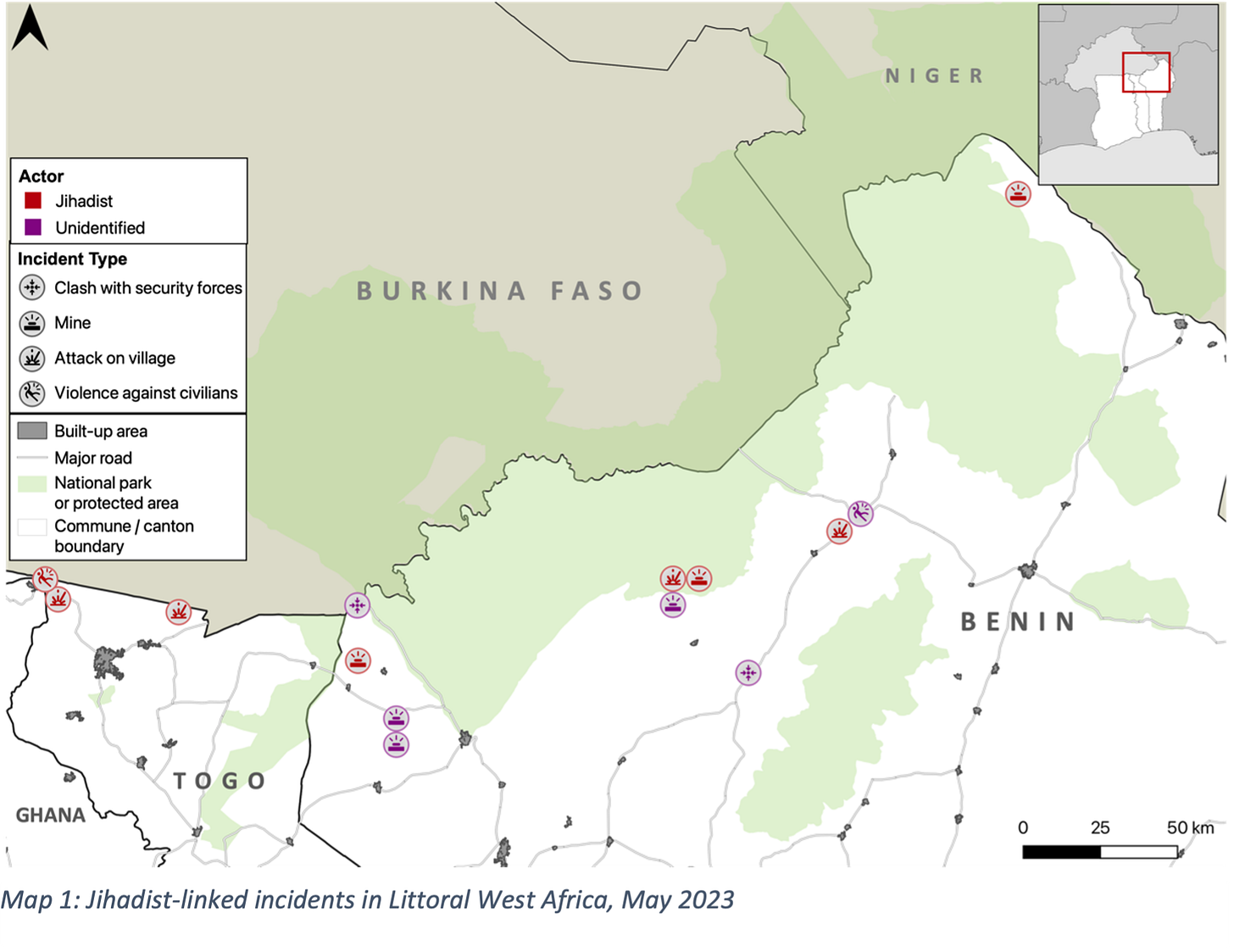Welcome to the Littoral West Africa Security Report for May 2023. This monthly report tracks the spread of jihadism from the Sahel to the northern areas of Côte d’Ivoire, Ghana, Togo, and Benin—also known as Littoral West Africa. As the situation deteriorates in Mali and Burkina Faso, we’re seeing more jihadist incidents in the Littorals. By tracking them, we aim to deliver insights that stakeholders—including governments, militaries, businesses, and NGOs—can use to create the conditions of peace and prosperity in the region.
Using our on-the-ground network, traditional and social media, and publicly available conflict data, we saw five incidents in Benin in May, a slight increase from the four we counted in April. There were two jihadist attacks on the villages of Kaobagou and Yinyinrou, resulting in 18 deaths and 14 kidnappings. Several improvised explosive device (IED) explosions also caused casualties.
We didn’t see any jihadist incidents in Côte d’Ivoire in May—which was the same as in April. Côte d’Ivoire has remained somewhat insulated from jihadism due to its relatively effective security measures, coordination with Burkinabè security forces, and preventing violent extremism strategy.
Côte d’Ivoire also announced the launch of a decade-long, two-phased National Policy of Integrated Border Management, budgeted at over 400 billion CFA (roughly US$ 656.29 million) to enhance border security and cross-border cooperation.
We didn’t see any jihadist incidents in Ghana in May. However, a non-jihadist incident occurred on 1 May when a group of youths attacked the village of Yabaga and forced the local community out of the area. We’ve seen recent tribal and ethnic conflict surrounding a chieftaincy feud in Bawku, which we don’t consider jihadism. There were no Bwaku incidents in May, compared to five in April. We attribute this to efforts by the Ghanaian government to stabilize the situation in Bwaku—which Ghanaian President Nana Akufo-Addo recently claimed to make a top priority.
We saw three jihadist incidents in Togo, including attacks on the villages of Namouno and Natongou, resulting in one death, one casualty, two kidnappings, and the theft of dozens of cattle. There were four incidents in Togo in April. In a positive development, Togolese President Faure Gnassingbé and French President Emmanuel Macron met to discuss Togo-France cooperation, regional issues, and Togo's role in combating terrorism, cross-border crime, and violent extremism.
International and Regional Developments
The African Land Forces Summit (ALFS), convened by the U.S. Army, ran from 8-12 May in Abidjan, Côte d’Ivoire. It brought together over 40 land force chiefs from Africa, thought leaders, and government officials. Discussions focused on strengthening U.S. and African security through fostering communication, cooperation, and planning among partner nations.
Takeaways from this month
We think Benin, Côte d’Ivoire, Ghana, and Togo are better off than Mali and Burkina Faso—whom Western security partners have, for all intents and purposes, written off as a lost cause. The Littorals have greater resources, more capable governments, and favorable ties with France, the United States, and other partners. Also, Washington’s policy currently is to help the littoral countries shore up their defenses against jihadism spilling over from Burkina Faso.
Nevertheless, we wonder whether Western strategy and security assistance will be enough to help Benin, Côte d’Ivoire, Ghana, and Togo stop the spread of jihadism as conditions in Burkina Faso and Mali get worse. Leadership in some littoral countries has already argued that the West’s abandonment of Burkina Faso—which serves as a safe haven for jihadists targeting the littorals—will make the situations in the northern parts of their countries worse. In short, they think the United States and the West must do more—not less—in Burkina Faso.
Do you need more and want to dig deeper into Littoral West Africa or other issues in Sub-Saharan Africa? We have more insights ready for you. Reach out to our team at 14 North or info@14nstrategies.com to learn more.





